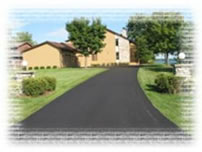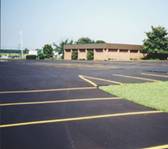What is Asphalt?
Asphalt is usually black in color and has a cement-like consistency, which happens to be formed by the distillation of crude petroleum. The cement like consistency is obtained through additives such as sand, filler and bitumen. The sand and bitumen aggregate must be dried so as to obtain the correct fluidity of the asphalt (or binder). Both then must be heated before mixing takes place, this is what is known as “hot mix”. |
 |
Asphalt is totally recyclable. It is made using recycled materials, thus it leads the way for preserving the world’s resources.
The production of Asphalt takes place in either a fixed or mobile mixing plant. In Europe alone, it is estimated that they have produced 300 million tones of hot Asphalt and 5 million tones of cold Asphalt.
Applications
 |
Asphalt is commonly associated with the construction of roads and highways, but it is also being used in many other areas. Due to asphalt’s speed and ease of installation, it is the chosen material for revitalizing roads and streets in short periods of time. Asphalts smooth texture provides the ideal finish for bike tracks, airport runways and racing tracks. It is also widely used residentially for driveways and paths around the home! |
Factors that Lead to Asphalt Paving Degradation
Asphalt Paving will slowly begin to show signs of aging over time. Here are a a list of factors which may affect and speed up the process of Asphalt Paving degradation.
- Sun: The sun is an enemy of Asphalt Paving. The natural process of morning moisture to afternoon sunlight cause cracks to become wider and deeper, due to the drying out of the natural oils.
- Raveling: This is the degradation of the binder that holds the aggregate in place, making the Asphalt Paving prone to cracking and becoming brittle.
- Cracking: This occurs when fine hairline cracks appear and can become wider and spread over the surface.
- Water: Water is a major enemy of Asphalt Paving. Water enters the cracks and erodes the binders and fines, which hold the aggregate together.
- Grease: Oil, grease and gasoline are damaging to Asphalt Paving. The saturation of oils can weaken the Asphalt Paving, and when it is washed and cleaned with water, it is again saturated with water, weakening it further.
If you maintain, fill in cracks and regularly seal your Asphalt Paving, these deteriorating factors can be prevented from taking effect.





